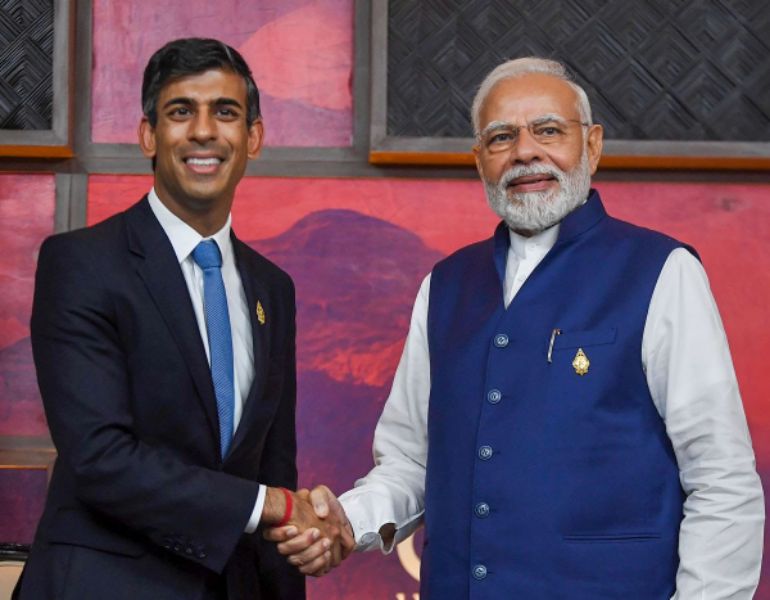
BBC under Fire for Controversial Documentary on Indian Prime Minister Modi
A documentary about Indian Prime Minister Narendra Modi broadcasted by British media company BBC has caused uproar, with people of Indian descent in Britain expressing their outrage. Allegations of a…

A documentary about Indian Prime Minister Narendra Modi broadcasted by British media company BBC has caused uproar, with people of Indian descent in Britain expressing their outrage. Allegations of a bigger plot behind the documentary have been made, and even the Prime Minister of Britain has commented on the issue.
The BBC recently produced a documentary about Prime Minister Narendra Modi of India, prompting a variety of reactions from the Indian community living in Britain. Many people have expressed their opinions on the documentary, with some praising it and others criticizing it. Meanwhile, the Government of India has responded with criticism, accusing the BBC of misrepresenting the truth. It remains to be seen how the situation will develop.
On Tuesday, the British broadcaster BBC released the first part of their two-part series, India: The Modi Question. This series examines Prime Minister Narendra Modi's political ascent, his relationship with the Rashtriya Swayamsevak Sangh, his elevation in the BJP, and his term as Chief Minister of Gujarat. One of the most contentious topics discussed in the series is the riots that occurred while Modi was Chief Minister. The series has been broadcast in many countries, including London, but not in India, leading to much debate. The second part of the series is set to air on 24 January.
According to reports by the leading Hindi Daily newspaper in India, Amar Ujala. There has been a massive backlash against the BBC in Britain following the release of their documentary. Thousands of Indians have taken to the internet to express their dissatisfaction, and many people of Indian descent living in the UK have cancelled their subscriptions to the BBC.
A multitude of Indian and British organizations have expressed their disapproval by sending letters to BBC's management and editor. It is alleged that BBC is deliberately attempting to malign India and Britain, with a biased outlook. Gayatri, president of 'The Reach India' organization, has declared that protests will take place in the streets following the release of the second part of the documentary on PM Modi on January 24.
Gayatri, the president of The Reach India, told Amar Ujala, a leading Indian news daily, that Rishi Sunak's election as Prime Minister of Britain came during a time of numerous issues, such as the Russia-Ukraine war and economic crisis. She noted that Rishi has been successful in tackling these problems, leading to a more positive situation. Furthermore, the connection between India and Britain has grown stronger since Rishi's election, which has made some people uneasy. Gayatri believes that anti-Hindu and anti-India forces are trying to destabilize Rishi's government, and the BBC documentary is part of a larger plot. She provided three points to back up her claim.
1. The opposition party in Britain, led by the Labor Party, is attempting to destabilize the government of Rishi Sunak through a conspiracy involving a BBC documentary that targets the Indian Prime Minister and implies that Hindus are intolerant. This is an attempt to weaken Sunak's leadership, as he has successfully navigated the country through many crises. The Pakistani-origin MP who raised the issue in Parliament is a member of the Labor Party, further supporting the idea that this is a politically motivated attack.
2. According to Gayatri, a significant trade agreement between India and Britain is in the works, and the release of the controversial BBC documentary may have been an attempt to sabotage this deal. If successful, the trade deal would bring mutual benefits to both countries. Thus, the timing of the release of the documentary raises suspicions that it was done deliberately to hinder the progress of the trade agreement.
3. Gayatri expresses concern over the editorial choices made by the BBC, citing a previous instance where they interviewed Shamima Begum, the wife of an ISIS terrorist, in a manner that presented the terrorist organization in a positive light and portrayed Begum as a victim. This is in contrast to their recent documentary that aimed to tarnish the image of the Prime Minister of India, one of the world's leading democratic nations. This inconsistency raises questions about the BBC's journalistic standards and integrity.
Protests and opposition to the controversial BBC documentary about India and its Prime Minister have intensified in Britain. Many Indian people and institutions have filed petitions and written letters to the BBC management and editor, expressing their objections. British citizens of Indian origin are also canceling their subscriptions to the network. The president of the 'The Reach India' organization, Gayatri, announced plans for street protests on January 24th.
The Indian Ministry of External Affairs has also criticized the documentary, stating that it is a biased and propagandistic piece with a colonial mindset, and has not been shown in India.
The Prime Minister of Britain, Rishi Sunak, has defended his Indian counterpart, Narendra Modi, and stated that the UK government's position on the matter has not changed.
BBC has defended its documentary on Indian Prime Minister Narendra Modi which has caused controversy. The network has issued a statement saying that the documentary is the result of thorough research and adheres to the highest editorial standards. The spokesperson also


